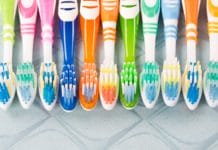As dental hygienists, we all know we should be individualizing our home care recommendations. Whether it be a toothbrush, interdental cleaner, or other home care product, just because we personally love a certain product for our own use, doesn’t mean all patients should be instructed to use said product.
When considering which toothbrush to recommend we need to understand our patients. Some patients are better at brushing than cleaning interdentally, others need to improve their brushing technique, while some patients need to start brushing more regularly all together. When recommending toothbrushes, this should all be taken into account, leaving out a cookie-cutter or one-size-fits-all approach.
Making our toothbrush recommendations a bit more difficult is popular marketing techniques. When patients see a TV commercial or online ad, they tend to insinuate every person will do best with that brush because it’s the highest powered or highest tech brush out there. This isn’t necessarily reality and doesn’t address each patient’s individual needs.
Consumers can often be misled with marketing, and further, this undermines the hygiene mission of individualizing recommendations, with the focus on long-term, healthy oral care habits. “Quick solutions,” like whitening or special bristles, may lead patients to think that “white teeth” equal “healthy teeth,” which hygienists know is not an accurate way to determine health. It is up to clinicians to guide patients to products that they feel the patient will use the most and in a proper manner to ensure a healthy outcome.
Factors to consider when recommending a toothbrush
Will the patient actually use it?
Though about an interdental cleaner, here is an example of making recommendations based on a one-size-fits-all approach. One of my family members, we will call her Jane, was recently seen by a hygienist who was new to the practice where Jane receives her dental treatment. Without even laying Jane back and assessing her periodontal condition, this hygienist immediately recommended a water flosser. To be clear, Jane is an impeccable flosser using string floss and also likes and uses interdental brushes. She has perfectly healthy gingiva, without an ounce of infection or bone loss in her mouth.
While I applaud this hygienist’s passion for a product, and in no way, shape, or form, am putting her down, I do wonder why this hygienist would recommend changing Jane’s excellent home care routine, simply to include a product the hygienist personally likes, but Jane absolutely will not be compliant with? My point is, just because you personally, absolutely love something doesn’t mean it’s best for all patients. There is no one-size-fits-all or cookie cutter solution in dentistry. Life would be boring if we were all the same, right?
As hygienists, we know a huge number of patients don’t even do the basics (i.e., brush twice a day, brush for two minutes, etc.) which has a much bigger impact on their oral health than any single feature might have. So you would rather ensure patients picked a product they actually would use consistently, over one they may not, and could potentially use the wrong way just due to our personal preferences?
Some patients can benefit from an electric toothbrush, while others cannot tolerate them
As hygienists, we know electric brushes can be a huge help when it comes to daily plaque control and overall gingival health. However, there are still patients who choose to use a manual brush, with poor oral hygiene who could benefit greatly from the change to an electric brush. The reason they may not switch could be one of many reasons; from the price point to sensitivity to the vibrations, to simple lack of motivation. This is precisely the reason why we need a toolset of options to choose from; we need to keep in mind options from affordable to expensive, from one mode to 5 modes, from sonic to oscillating. If a patient cannot tolerate a high powered electric brush, we need to be able to recommend one they can.
For instance, my sister and I are extremely alike; we are both in the dental field, we are super organized, like the same things, and have even been mistaken for twins, despite our almost six-year age difference. However, I love a certain electric toothbrush, as it meets my individual needs, where my sister cannot tolerate the brush I love. It would be silly for me to keep harping on her to switch to the brush I love because it would sit and collect dust. The same goes for our patients; we must take into consideration their needs.
At the end of the day, helping the patients who have never upgraded to an electric toothbrush, but may like to, choose an option with a timer and vibrations will have a fundamentally bigger impact on their overall health, than only offering a top-of-the-line toothbrush or the toothbrush you personally like to every patient.
Price does not always equal effectiveness for all patients
Continuing from above, the price of a product doesn’t always correlate with how effective the toothbrush will be for every patient. Much of the added cost comes from added modes and personalization, add-ons that do not necessarily result in a better outcome. Patients can make the mistake thinking that the more expensive the toothbrush, the less work they need to do (leading to worse brushing habits), or that less expensive brushes are “less effective” if they aren’t as high powered.
As hygienists, we know the key point is how patients are using the brush, and that all brushes can be just as effective an oral care tool when if used properly in tandem with other home care habits (2 minutes, 2x a day, in conjunction with interdental aids, etc.). We should be focusing on the idea of which toothbrush a patient will actually enjoy using, use consistently, and with the correct technique.
Affordability
As hygienists, we need to recognize that a large portion of the American population cannot afford brushes and products in the $50-$250 range. We should be sensitive to this fact and have options available for patients who are looking for something more affordable. Patients shouldn’t feel like their homecare routine is “less effective” or “less valuable” because they aren’t using the most expensive products on the market. We should be motivated to educate patients that the way to a healthy mouth is consistent, healthy oral care habits, and the basis of that is not just an “expensive toothbrush.”
In conclusion, as hygienists, we need to look beyond ourselves and our personal preference and perhaps re-evaluate what motivates our patient home care recommendations. Are you making a recommendation based on your needs and specific likes, not considering the patients’ needs? Are you recommending a certain toothbrush because you are making a commission off it? I encourage hygienists to go back to the basics and reprioritize the importance of consistent home care routines, with proper technique, using products based on a patient’s individual needs.












